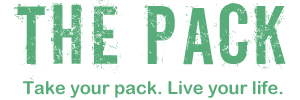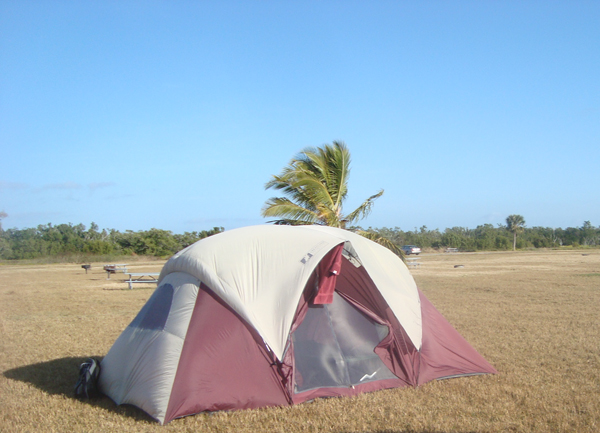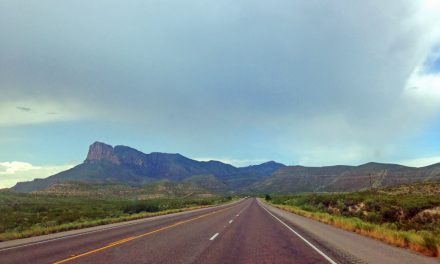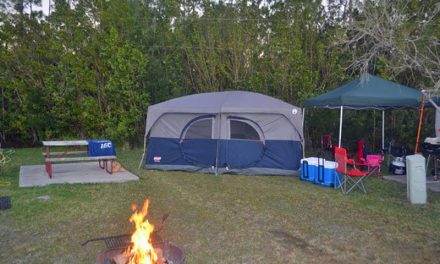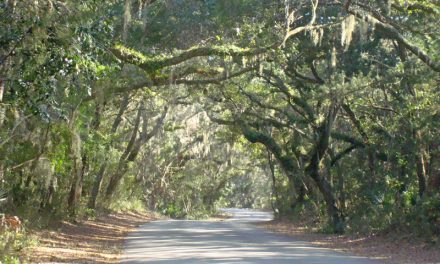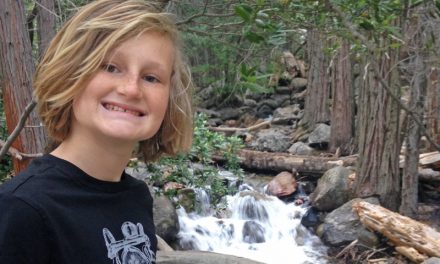
Tent camping with kids — and their toys
I had hoped my first post here about camping would be one where I could provide tips for taking children on an adventure, or another post about how camping not only helps you connect with nature but also teaches you to be resourceful. A positive post.
But then Outside magazine’s August 2018 issue came out. The article “Unhappy Campers” details what I have known for years — how hard it can be to get campsites on public lands. It’s true that more people are camping and there is a greater demand for sites than there are sites. The main problem the article focuses on is that public lands have used third-party private companies for handling campsite reservations, and they haven’t worked as well as campers would like. This has led to a change in how campsites on federal lands are going to be able to be reserved, thanks to better real-time information on availability. Campgrounds run on the state level, though, won’t see this change.
My family has camped mainly in Florida, where we live. So even though I don’t want to pick on my state, this is the experience I have to draw from. Unfortunately, for a typical family weekend camping trip where we would travel 2-5 hours from home, we’re still in the state of Florida. Driving with children, we can barely make it to Georgia in under 6 hours. Any farther than 5 hours, though (10 hours roundtrip), and you really need more than a weekend of camping to make your time worthwhile. So we have no choice but to stay in Florida for a Friday-Sunday weekend trip. And many of the most-natural and recreation-friendly spots to camp are in state parks.
Why is it so hard to get a campsite?
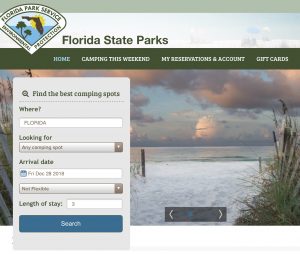
Making campsite reservations
My husband and I started camping in state parks before we had kids, and before the park system started using ReserveAmerica to handle campground reservations. ReserveAmerica is a company that reserves campsites for several states. Before they came along, my husband and I could pick out a weekend to camp and just go. When the ReserveAmerica system was put in place, though, we started having trouble getting sites. We asked a park ranger what was going on. He was the first one to tell us the new system would allow people to make campground reservations up to 11 months ahead. We were shocked. The ranger told us if we didn’t like it (as it appeared he didn’t either), we should make our voices known. We did, but nothing changed.
Problem 1: Reselling Campsites
A couple years ago while feeling frustrated over not being able to get a campsite, I went online to seek help or new ideas to the problem. I came across a post by other frustrated campers who had experienced the same problem booking Florida sites and who said they were solicited by a man who offered them the chance to get into campsites for a booking fee of $60. The writer said he was suspicious of some people being able to “hack” the online reservation system, and even use it to “scalp” campsites. (One company openly has a site set up to do this for the California State Parks campgrounds.)
The Florida Department of Environmental Protection, which oversees the state parks, was aware of the problem of reselling campsites at least by three years earlier in 2013, and in a document that has since appeared to have been removed from the DEP site but is now here, stated:
“Bahia Honda State Park and other Parks in the Park system that are at or near 100% occupancy during peak seasons, have become the subject of third party abuse and manipulation for financial gain, at the expense of the public.”
The document says it took action to “minimize the reselling of campsite reservations.” However, the penalty for being caught isn’t much. On the site, it says, “If a reservation is discovered to have been offered for resale or resold the reservation will be cancelled and the original purchaser will be charged the $17.75 cancellation fee.” (ReserveAmerica cancellation fees and policies appear to vary by state.)
If you’re making $60 to get someone a campsite as these other campers wrote about, this fee isn’t even a third of that profit — and that’s only if you get caught.
Problem 2: Campsite reservation system
People who scoop up campsites for profit aren’t the only problem, though. The reservation system itself is flawed.
If you can get past the poor design of the site where you have to click to view multiple pages of campsite listings within the same park rather than being able to see all park campsites on one page, and where you can see only 2 weeks of availability at a time (instead of a full month like on hotel booking sites), you still have to make your reservation sometimes 11 months ahead — especially for the most popular parks.
Let’s say you know the 11-month campsite booking situation and are thinking well ahead. It’s March 2018 and you want to take advantage of the long Presidents Day weekend when the kids have that Monday off school, and go camping. You wait your 11 months and try to book a site for 2019. You know ReserveAmerica opens up reservations starting at 8 am, so you are ready at your computer at that time to reserve your site — only to find out at 8:01 am there are none available.
How did this happen?
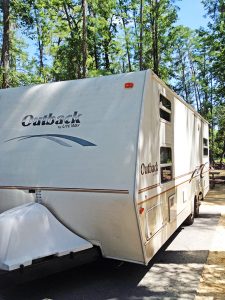
Camping in a trailer or RV helps extend the camping season, but you still have to watch the weather
The maximum stay at a Florida state park is 14 nights. So ReserveAmerica allows people to reserve campsites two weeks out. Knowing this, many people get ahead of the 11-month reservation window by two weeks by reserving 14 days before the day they actually want. They pay for the full two weeks, and then sometime later, cancel the days within those two weeks they never really wanted anyway. So they book sites 11.5 months ahead. All they have to do is pay a $10 fee to change their reservation dates, and they get a refund on the nights they weren’t going to camp. This was explained to me by a ReserveAmerica reservation representative when I called one time to ask how I kept missing out on sites. Apparently, this is nothing new, and not limited to just Florida state parks.
So for the cost of a cheap pizza, you can game the campsite reservation system or even resell your site to someone else. And in our experience, the parks don’t seem to care or get involved because the third-party reservation system means park staff’s hands are tied — and parks will make money on the booking of campsites no matter who fills that spot.
How the poor campsite reservation system hurts kids
But exactly who is filling that spot is a concern for some. For me as a nature lover and a parent, I believe in teaching kids to love the natural environment so they will grow up to appreciate and protect it. I love the quote by Baba Dioum, “In the end we will conserve only what we love; we will love only what we understand; and we will understand only what we are taught.” For several years now, people have been wringing their hands over how kids spend less and less time outside and how kids need to spend more time in nature. So when I see our state park campsites seemingly being dominated by out-of-state or out-of-country visitors (many are adults who spend balmy Florida winters going from campground to campground) while my children can’t get in for a weekend here or there, it doesn’t seem right. Residents of any area should be able to get to know their respective corners of the world. If this doesn’t matter to some people, then look at the financial aspects of it: As a whole, Florida state parks bring in enough money to pay for 77% of their total costs, according to a 2015 news article, so the state has to make up the difference. In 2016-2017, the budget to spend on Florida state parks was $149 million.
I’m not the only one who thinks Floridians aren’t getting a fair shake at reserving campsites, because the state park system addresses this question on its site: “Why can’t Florida residents get a reservation? Camping in Florida State Parks is a very popular activity and we have ensured that everyone has the same opportunity to call or go online and make a reservation. We welcome visitors from Florida and from throughout the world to our award winning parks each year. Over the past five years, Florida residents have made up, on average, over 61% of all of our overnight visitors annually.”
First, let’s take a closer look at that 61%, if only we could. (I asked the state for data, and when it provides me with this information, I will provide an update.) Is that spread out throughout the calendar year — or only when camping is tolerable in Florida (say, October-May)? Has the parks system looked at the different regions of the state and found different percentages in different areas? Because, let’s face it, non-Floridians aren’t as likely to go to the lesser-known parks near smaller towns or where there’s not a beach, spring, or river. These factors could skew that percentage.
Second, why is it “everyone has the same opportunity” to campsites? As I’ve mentioned, many Floridians can hardly get out of the state for a weekend camping trip; it’s the environment that makes up our home; and our state budget helps pay for the parks. Why don’t residents of a given area get first pick? In some places, they do. For example, Florida’s Pinellas County gives county residents an earlier booking window for its Fort De Soto Campground. New York has proposed giving residents preference for state parks. In some states, campgrounds charge a higher fee for out-of-area campers. But in many states, it’s a free-for-all.
(I want to say I’m not anti-tourist. My family goes to other states and countries, after all, so it would be hypocritical of me to be against people traveling. If you want to come to my state, I hope you have a great time and I’m happy to provide tips for families visiting Florida. I’m making the point that if the state parks system doesn’t care how people are reserving sites, disregards people who are making money by reselling sites, and gives a shoulder shrug to its own residents’ ability to enjoy the land where they live, it’s a poor system.)
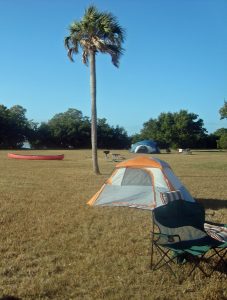
Tent camping in Florida
All of these factors combine to make it harder for families to take their kids on camping trips. Families with children often have work and school commitments, leaving only weekends available for trips — so the advice to camp during the week when campgrounds have more availability doesn’t apply. Kids are typically out of school during summer, but that’s the rainy season in Florida — aka hurricane season — when the heat index can be over 100F and disease-carrying mosquitoes are more prevalent. Camping in an RV or trailer that has A/C makes summer camping more tolerable, but not every family has the budget for an RV or wants to camp this way. What about those sites set aside for walk-in campers? Forget taking a chance that maybe a site would be available after you’ve packed all your gear, kids, snacks, food, and water and driven a few hours from home only to be turned away with sad little faces in the back seat.
States need to change how campers make campsite reservations
What are the solutions? There are several ways states could make improvements:
- As some states and municipalities have done, states could give residents an earlier chance to book campsites.
- State parks could set aside a percentage of sites for residents, or even for families, to ensure the state’s children get to camp.
- The state could make campsite reservations nonrefundable to make it less tempting for people to book two weeks’ worth of overnight stays when all they’re trying to do is get three nights, just so they can get ahead of the 11-month reservation window.
- Parks could take back control over their own campsite reservations, where staff would be able to spot reservation abuse more easily.
- Taking a cue from the recent change in federal lands’ campgrounds, companies like ReserveAmerica that book campsites for state-run campgrounds should provide open data on sites.
In addition, in order to avoid campsites sitting empty because campers simply don’t show up — which adds to the problem of people not getting a campsite — campgrounds could require people to arrive by a certain time unless they call to say why they can’t make it that day and that they will be there the next day, or forfeit the site.
Will states make these improvements? Maybe, if enough people speak up.
Can’t get a campsite? Tips if you’re having trouble
- Now that you know how to game the system, you might have no other choice than to do so, at least until the state or ReserveAmerica improve the experience. Get out your calendar, open the site, and mark which day you need to be at your computer at 8 am to get your site 11.5 months in advance. Don’t forget, you have to be willing to go back and cancel the days you don’t want and pay the cancellation fee. For the sake of others who want to camp, don’t wait 10 months to do this. Also, don’t blame me for this advice; this is what a ReserveAmerica representative told me (see above). Although I’ve known about this method, I haven’t done it … but I might resort to it in the future if it’s what our family has to do to get a “fair” shot at a campsite.
- Use a free campsite availability service developed by yet another frustrated camper that will give you a heads-up when a site becomes available in your park.
- Camp at other federal lands, state forests, or county parks (which might not be as well-known as federal and state parks and therefore have less demand).
- Go high tech and use a VPN so you have a faster computer connection to get available sites at 8 am sharp.
- Look into privately run campgrounds like Thousand Trails, KOA, and other parks. You might not get the same quality of a natural environment, but some of these parks are near enough to the place you want to go that you can leave your campground and go there for the day.
- Try direct private campsite rental sites like Tentrr, Hipcamp, Gamping, and even Airbnb.
My family loves camping. We love our state, and we love our state parks. We know many other families feel this way about where they live. We just ask that reserving campsites be fair.
